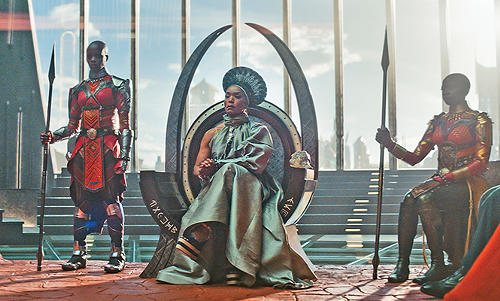Top of the Mourning
Black Panther: Wakanda Forever struggles to solve the problem of its lost hero.
By Scott Renshaw @scottrenshawFor nearly 15 years now, Marvel Studios has been building its own universe, and indeed now a multiverse—but until Black Panther: Wakanda Forever, it hasn't really had to deal with the real world intruding on that universe. That's what faced writer/director Ryan Coogler in the aftermath of the 2020 death of Chadwick Boseman, the regal T'Challa of the blockbuster original 2018 Black Panther. His passing left a gaping hole in the prospects for a sequel, and a heartbreaking question even in the comic-book realm so steeped in new characters stepping into established costumed identities: How do you make a Black Panther movie without your Black Panther?
The prologue sequence of Wakanda Forever sets the stage, with T'Challa's scientifically brilliant sister Shuri (Letitia Wright) bereft over being unable to save his life from an unspecified illness. A year later, the kingdom of Wakanda—now ruled once again by T'Challa and Shuri's mother, Queen Ramonda (Angela Bassett)—is still grieving, but faces a new threat. With the powerful metal vibranium now sought by other members of the international community, the existence of vibranium in the undersea realm of Talokan puts them at risk, bringing Wakanda into potential conflict with Talokan's leader, the mutant warrior Namor (Tenoch Huerta).
The origin story of Namor—also known to comic-book fans as the Sub-Mariner—gets re-imagined as the result of an indigenous culture trying to escape the bonds of colonialism, which certainly keeps it in the thematic wheelhouse of the first Black Panther. Namor has some 500-year-old debts to repay, and while Huerta is effectively intense, his character motivation bears more than a passing resemblance to that of Black Panther's Killmonger—which doesn't do this movie any favors, considering how indelible Michael B. Jordan was as the righteously furious, sorta-makes-sense antagonist to T'Challa. To paraphrase the guiding principle of another Marvel hero, Wakanda Forever continues the exploration of what kind of great responsibility comes with great power, although perhaps in a way too similar to the way Coogler already explored it once.
Also a bit too similar is Coogler's approach to the story's action sequences, which continue not to be his strength as a filmmaker. There are a few solid visual ideas built into the Talokan forces as adversaries for the Wakandans—including specialized explosives that turn into tidal waves of water—but not enough stylistic punch to distinguish the fights from a dozen other Marvel movies where anonymous armies and airships do battle. Warships explode, civilians suffer, and not much of it feels at all consequential (or fun).
Of course, it's somewhat understandable if Coogler's attention was focused on the challenge of T'Challa's absence—which, like Billy Beane in Moneyball, he chooses to respond to not so much by replacing him, as by re-creating him in the aggregate. While Shuri is clearly at the center of the story, dealing with unresolved grief and guilt, Wakanda Forever offers centerpiece moments also to Bassett's Queen Ramonda, to the Dora Milaje general Okoye (Danai Gurira), to the Wakandan chieftain M'Baku (Winston Duke), and the spy-turned-schoolteacher Nakia (Lupita Nyong'o). There's even another new character in genius MIT student Riri Williams (Dominique Thorne), introduced in anticipation of an upcoming Disney+ series. The result feels busy and fragmented, an attempt to give the audience multiple possible points of connection in the hope that at least one of them sticks.
That assessment may not be entirely fair to Letitia Wright, who certainly does her part to make sure that Shuri is a protagonist with her own journey and personality. She invests herself in Coogler's vision of these Black Panther movies as stories with more of an edge in their voice than most of the other MCU entries, built on the idea of how an icon of justice should engage with an unjust world—by hiding from it, by helping it, or by deciding to burn it to the ground.
Yet from that extended funereal prologue, it's clear that Wakanda Forever is going to be almost too immersed in honoring Boseman and T'Challa. As fitting as it may be for one of these Black Panther narratives to be about not forgetting what has been lost, it also needs to give us a reason to remember what's happening in the present. Now that Coogler has paid his respects, perhaps the next Black Panther movie can begin with its new feet planted firmly on the ground.
More by Scott Renshaw
-
CHALLENGERS feature movie review
Zendaya centers a romantic triangle with a unique relationship spin
- Apr 24, 2024
-
Film Reviews: New Releases for April 19
The Ministry of Ungentlemanly Warfare, Abigail, The Beast, Hard Miles, Sasquatch Sunset and more
- Apr 19, 2024
-
Feature film review: THE BEAST
A filmmaker's compelling ideas get a bit tangled in references to his creative influences.
- Apr 17, 2024
- More »




